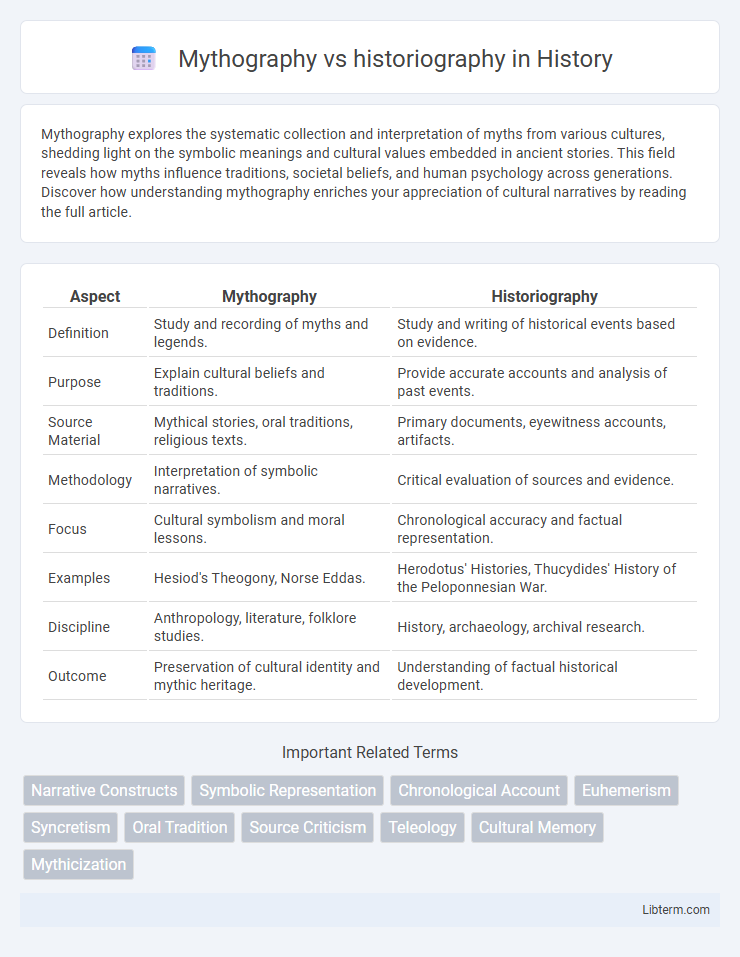Mythography explores the systematic collection and interpretation of myths from various cultures, shedding light on the symbolic meanings and cultural values embedded in ancient stories. This field reveals how myths influence traditions, societal beliefs, and human psychology across generations. Discover how understanding mythography enriches your appreciation of cultural narratives by reading the full article.
Table of Comparison
| Aspect | Mythography | Historiography |
|---|---|---|
| Definition | Study and recording of myths and legends. | Study and writing of historical events based on evidence. |
| Purpose | Explain cultural beliefs and traditions. | Provide accurate accounts and analysis of past events. |
| Source Material | Mythical stories, oral traditions, religious texts. | Primary documents, eyewitness accounts, artifacts. |
| Methodology | Interpretation of symbolic narratives. | Critical evaluation of sources and evidence. |
| Focus | Cultural symbolism and moral lessons. | Chronological accuracy and factual representation. |
| Examples | Hesiod's Theogony, Norse Eddas. | Herodotus' Histories, Thucydides' History of the Peloponnesian War. |
| Discipline | Anthropology, literature, folklore studies. | History, archaeology, archival research. |
| Outcome | Preservation of cultural identity and mythic heritage. | Understanding of factual historical development. |
Defining Mythography and Historiography
Mythography involves the systematic collection and interpretation of myths, emphasizing symbolic narratives that reveal cultural beliefs and values, often transmitted through oral or literary traditions. Historiography refers to the study and writing of history based on critical analysis of primary sources, aiming to reconstruct past events with accuracy and contextual understanding. While mythography interprets mythic stories as reflections of collective identity, historiography prioritizes empirical evidence and chronological documentation to understand historical reality.
Historical Development of Both Disciplines
Mythography emerged in ancient times as the systematic collection and interpretation of myths, primarily serving religious and cultural purposes in civilizations such as Greece and Rome. Historiography developed later, gaining prominence during the classical period with figures like Herodotus and Thucydides emphasizing critical analysis and chronological documentation of events. Over centuries, historiography evolved into a rigorous academic discipline focused on empirical evidence and source criticism, while mythography remained centered on preserving traditional narratives and symbolic meanings.
Core Objectives: Myth vs. History
Mythography centers on the collection and interpretation of myths, aiming to explain cultural beliefs, moral lessons, and supernatural elements within societies. Historiography focuses on the critical examination and recording of historical events based on evidence, seeking to establish factual accuracy and causality over time. The core objective of mythography is to explore symbolic meaning and collective identity, whereas historiography prioritizes empirical truth and chronological documentation.
Methodological Approaches
Mythography employs interpretive analysis focusing on symbolic meanings, cultural narratives, and allegorical elements within myths, relying heavily on literary and anthropological methods. Historiography emphasizes critical evaluation of primary sources, chronological accuracy, and evidence-based reconstruction of past events using techniques like source criticism and archival research. The methodological divergence highlights mythography's focus on narrative and meaning versus historiography's commitment to empirical validation and factual precision.
Sources and Evidence Utilization
Mythography relies primarily on ancient myths, oral traditions, and symbolic narratives as sources, often emphasizing interpretation over factual accuracy. Historiography utilizes documented evidence such as archives, official records, eyewitness accounts, and verified artifacts to reconstruct and analyze past events. While mythography prioritizes cultural and moral meaning in its evidence, historiography demands critical evaluation and corroboration to establish historical reliability.
Interpretation and Narrative Construction
Mythography involves the interpretation and narrative construction of traditional stories, focusing on symbolic meanings, cultural values, and allegorical elements. Historiography emphasizes critical analysis and evidence-based storytelling to reconstruct past events with accuracy and context. While mythography shapes collective identity through imaginative narratives, historiography seeks objective understanding through systematic documentation and source evaluation.
Cultural and Societal Impacts
Mythography shapes cultural identity by preserving collective beliefs, rituals, and values that influence social norms and moral frameworks within communities. Historiography provides a structured understanding of past events, fostering critical analysis and informed perspectives that guide societal development and policy-making. Together, mythography and historiography interact to balance tradition with empirical knowledge, shaping cultural legacies and societal progress.
Intersections and Divergences
Mythography and historiography intersect in their attempts to explain past events, with mythography embedding cultural values and symbolic meanings within narratives, while historiography seeks factual accuracy and empirical evidence. Divergences arise as mythography prioritizes allegorical and supernatural elements that convey moral or existential truths, whereas historiography demands critical analysis and source verification to reconstruct historical realities. Both fields shape collective memory but differ fundamentally in methodology and purpose, reflecting the tension between mythic interpretation and historical documentation.
Modern Relevance of Each Field
Mythography, which studies myths and their cultural symbolism, remains relevant for understanding how societies use storytelling to shape identity and convey moral values in contemporary media and literature. Historiography, the analysis of historical writing methods and biases, is crucial today for critically evaluating sources and constructing accurate narratives amid widespread misinformation and digital information overload. Both fields address modern challenges by revealing how narratives influence perception, memory, and cultural continuity.
The Future of Mythography and Historiography
The future of mythography lies in its evolving role as a critical tool for understanding cultural narratives and collective identities, integrating digital humanities and interdisciplinary approaches to preserve and reinterpret ancient myths with greater accuracy. Historiography is increasingly shaped by advances in data analytics and artificial intelligence, enabling historians to analyze vast archives and uncover nuanced perspectives that challenge traditional historical narratives. Both fields are converging through innovative technologies and methodologies, enhancing their ability to contextualize human experience and bridge gaps between myth and history in scholarly research.
Mythography Infographic

 libterm.com
libterm.com